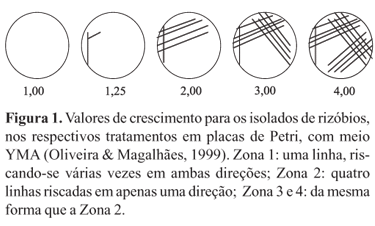Aluminum content and acidity of Amazonian soils may decrease the population of rhizobia, which fix N2, solubilize insoluble phosphates, and increase the availability of P in the productive systems. The aim of this work was to evaluate the nodulation capacity, tolerance to acidity and to toxic aluminum, as well as the capacity to solubilize calcium and aluminum phosphates of rhizobia isolates obtained from farm soil samples of Iranduba, AM, Brazil. Soil samples were used as source of inocula for cowpea bean, and isolates were extracted from the nodules, in order to test tolerance and solubilization. Soil samples presented populations of rhizobia with potential to be used as source of inocula for cowpea. INPA-M10 tended to surpass all other inocula in relation to the shoot dry matter yield. There was a significant correlation between the number and mass of the nodules, indicating that isolated rhizobia presented nodules of similar sizes. The sensibility to acidity and aluminum was showed by 43% of the isolated rhizobia; the other presented itself as tolerant. The solubilization of calcium phosphate was observed in the presence of 57% of isolated rhizobia. The same proportion occurred in the solubilization of aluminum phosphate.
nitrogen; acidity; toxic aluminum; phosphate solubilizing





